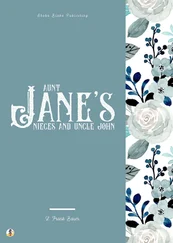Ouida - A House-Party, Don Gesualdo, and A Rainy June
Здесь есть возможность читать онлайн «Ouida - A House-Party, Don Gesualdo, and A Rainy June» — ознакомительный отрывок электронной книги совершенно бесплатно, а после прочтения отрывка купить полную версию. В некоторых случаях можно слушать аудио, скачать через торрент в формате fb2 и присутствует краткое содержание. Жанр: foreign_prose, literature_19, foreign_antique, на английском языке. Описание произведения, (предисловие) а так же отзывы посетителей доступны на портале библиотеки ЛибКат.
- Название:A House-Party, Don Gesualdo, and A Rainy June
- Автор:
- Жанр:
- Год:неизвестен
- ISBN:нет данных
- Рейтинг книги:4 / 5. Голосов: 1
-
Избранное:Добавить в избранное
- Отзывы:
-
Ваша оценка:
- 80
- 1
- 2
- 3
- 4
- 5
A House-Party, Don Gesualdo, and A Rainy June: краткое содержание, описание и аннотация
Предлагаем к чтению аннотацию, описание, краткое содержание или предисловие (зависит от того, что написал сам автор книги «A House-Party, Don Gesualdo, and A Rainy June»). Если вы не нашли необходимую информацию о книге — напишите в комментариях, мы постараемся отыскать её.
A House-Party, Don Gesualdo, and A Rainy June — читать онлайн ознакомительный отрывок
Ниже представлен текст книги, разбитый по страницам. Система сохранения места последней прочитанной страницы, позволяет с удобством читать онлайн бесплатно книгу «A House-Party, Don Gesualdo, and A Rainy June», без необходимости каждый раз заново искать на чём Вы остановились. Поставьте закладку, и сможете в любой момент перейти на страницу, на которой закончили чтение.
Интервал:
Закладка:
"Russians are tremendous swells at palaver," he says, with much contempt, "gammon you no end if you like to believe 'em: they've always some political dodge or other behind it all."
"I don't say she isn't an agreeable woman," he continues, now: his admiration of Madame Sabaroff is much mitigated by his sense that she has a rather derisive opinion of himself. "I don't say she isn't an agreeable woman, but she gives me the idea of artificiality,—insincerity,—mystery."
"Just because she's a Russian!" cries his wife, with disdain.
"My dear George," observes Brandolin, "there are preconceived ideas about all nationalities. As a rule, they are completely false. The received Continental idea is that an Englishman is a bluff, blunt, unpleasant, opinionated person, very cross, very clean too it is true, but on the strength of his tub and his constitution despising all the rest of mankind. Now, how completely absurd such an opinion is! You yourself are an example of the suaviter in modo, fortiter in re , of which the true-blue Briton always gives so admirable an example."
Usk laughs, but sulkily; he has the impression that his beloved friend is making fun of him, but he is not quite sure. He himself believes that he is an ideal Englishman; Brandolin is only half or a quarter of one, he does not shoot, wears furs in winter, only drinks very light Rhenish wine, never goes to any church, and never cuts his hair very short. Added to this, he has no fixed political opinion, except a general impression that England and the world in general are going down-hill as fast as they can, "tobogganing" as they say in Canada, at the rate of fifty miles a minute, to land in the slough of Socialism and be picked out of it by some military despot,—democracy invariably ending in absolutism.
"What ridiculous rubbish!" says his wife. "You might as well say that the demoiselles-mannequins at Worth's or Rodrigue's are conspiring for the Orleanists when they try on my clothes."
"They are conspiring for the ruin of your family," says Usk, with a groan. "Whose purse can stand those Paris prices?"
"What an irrelevant remark!" cries Lady Usk. "You are always dragging money-questions into everything."
"Those faiseurs , as you call 'em," continues Usk, unheeding, "are at the root of half the misery of society. Women get into debt up to their eyes for their toilets, and they don't care what abomination they do if they get enough out of it to go on plunging. Hundred-guinea gowns soon make up a pretty total when you change 'em three times a day."
"And if women are guys aren't the men furious?" asks his wife. "Even if they try to economize, aren't they always taunted with being dowdies? You none of you know anything about the cost of things, and you expect everybody to be bien mise on a halfpenny a day. When Boom saw me at Ascot this year he stared at me, and whispered to me, 'Oh, I say, mother! you've got the same bonnet on you had at the Oaks. I do hope the other fellows won't notice it.' That is how he will speak to his wife some day; and yet I dare say, like you, he will expect her to get her bonnets from Virot at ten francs apiece!"
Lady Usk is angry and roused.
"Look at my poor little sister," she goes on. "What a life that brute Mersey leads her about money! All those dreadfully plain girls to dress, and nothing to do it on, and yet if they are not all well got up wherever they go to, he swears he is ashamed to be seen with them. You can't dress well, you can't do anything well, without spending money; and if you haven't money you must get into debt. That is as clear as that two and two are four. When ever do men remember their own extravagances? You smoke ten cigars a day; your cigars cost a shilling or eighteenpence each,—that is ten or fifteen shillings a day; five pounds a week, not counting your cigarettes! Good heavens! five pounds a week for sheer silly personal indulgence that your doctors tell you will canker your tongue and dry up your gastric juice! At all events, our toilets don't hurt our digestion; and what would the world look like if women weren't well dressed in it? Your cigars benefit nobody, and only make your teeth yellow."
"Well, in a year they cost about what one ball-gown does that's worn twice."
"I always wear mine three times, even in London," says Dorothy Usk, with conscious virtue. "But I don't see any sin in spending money. I think it ought to be spent. But you are always dragging money-questions into everything, and Boom says that the Latin person whom you and Lord Brandolin are always quoting declares most sensibly that money should always be regarded as a means, never as an end; and if it is to be a means to anything, must not it be spent before it can become so?"
"That's neither here nor there," replies her lord; "and if Boom only reads his classics upside down like that he'd better leave 'em alone."
"You are never content. Most men would be delighted if a boy read at all ."
"I don't know why, I'm sure," replies Usk, drearily. "Reading's going out, you know; nobody'll read at all fifty years hence: poking about in guinea-pigs' stomachs, and giving long names to insects out of the coal-hole, is what they call education nowadays."
"Frederic Harrison has said very aptly," remarks Brandolin, who is present at this conjugal colloquy, and seeks to make a diversion on it, "that the boast of science is to send the Indian mails across seas and deserts in nine days, but that science cannot put in those mail-bags a single letter equal to Voltaire's or Sévigné's, and he doubts very much that there is one."
"It's an ill bird that fouls its own nest," says Usk, grimly: "still, I'm very glad if those scientific prigs fall out among themselves."
"I think some people write charming letters still," says Dorothy Usk. "Of course when one is in a hurry—and one is almost always in a hurry–"
"Hurry is fatal, Lady Usk," says Brandolin. "It destroys style, grace, and harmony. It is the curse of our times. The most lovely thing in life is leisure; and we call it progress to have killed it."
"Read this letter," says his hostess, giving him one which she holds in her hand. "There is nothing private in it, and nothing wonderful, but there is a grace in the expressions; whilst the English, for a foreigner, is absolutely marvellous."
"I thought there were no foreigners?" says Usk. "I thought steam had effaced nationalities?"
His wife does not deign to reply.
Brandolin has taken the letter with hesitation. "Do you really think I may read it?"
"When I tell you to do so," says Dolly Usk, impatiently. "Besides, there is nothing in it, only it is pretty."
Brandolin reads; it is on very thick paper, almost imperceptibly scented, with a princess's crown embossed on it and a gold X.
"It is very kind of you, dear Lady Usk, to have remembered a solitaire like myself in the midst of your charming children and your many joys." ("My many annoyances, she means," interpolates Lady Usk.) "I will be with you, as you so amiably wish, next Tuesday or Wednesday. I am for the moment in Paris, having been this month at Aix, not that I have any aches or pains myself, but a friend of mine, Marie Woronszoff, has many, and tries to cure them by warm sunshine and the cold douches which her physicians prescribe. There are many pleasant people here; every one is supposed to be very ill and suffering agony, but every one laughs, flirts, plays, sits under the little tents under the trees, dances at the Casino, and eats a fair dinner as usual, so that if Pallida Mors be indeed among us she looks just like every one else. I came to Aix from my own place on the White Sea, and the gay groups, the bright alleys, the green embowered chalets, and the goatherds with their flocks which come tinkling their bells down the hill-sides in all directions, all seemed to me like an operetta of Offenbach's, spiritualized and washed with the pure daylight and the mountain-air, but still Offenbach. How are your children? Do they still care for me? That is very sweet of them. A day at their years is as long as a season at mine. Assure them of my unforgetting gratitude. I shall be pleased to be in England again, and, though I do not know Surrenden, my recollections of Orme tell me d'avance that I shall in any house of yours find the kindest of friends, the most sympathetic of companions. Say many things to your lord for me. I think he is only so discontented because the gods have been too good to him and given him too completely everything he can desire." ("That's all she knows about it!" says Usk, sotto voce .) " Au revoir , dear Lady Usk. Receive the assurance of my highest consideration, and believe in my sincere regard. Bien à vous. —Xenia P. Sabaroff."
Читать дальшеИнтервал:
Закладка:
Похожие книги на «A House-Party, Don Gesualdo, and A Rainy June»
Представляем Вашему вниманию похожие книги на «A House-Party, Don Gesualdo, and A Rainy June» списком для выбора. Мы отобрали схожую по названию и смыслу литературу в надежде предоставить читателям больше вариантов отыскать новые, интересные, ещё непрочитанные произведения.
Обсуждение, отзывы о книге «A House-Party, Don Gesualdo, and A Rainy June» и просто собственные мнения читателей. Оставьте ваши комментарии, напишите, что Вы думаете о произведении, его смысле или главных героях. Укажите что конкретно понравилось, а что нет, и почему Вы так считаете.












